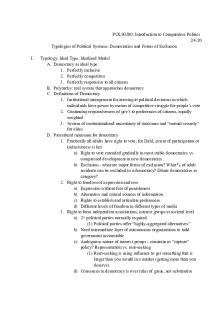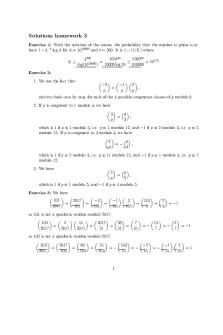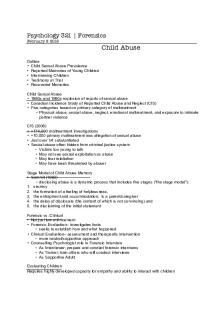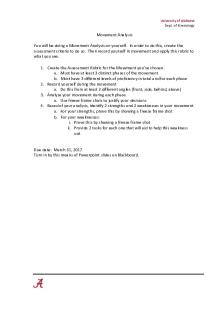Revolutions in Theory - Taught by Professor Linda Cook PDF

| Title | Revolutions in Theory - Taught by Professor Linda Cook |
|---|---|
| Course | Introduction To Comparative Politics |
| Institution | Brown University |
| Pages | 2 |
| File Size | 78 KB |
| File Type | |
| Total Downloads | 9 |
| Total Views | 151 |
Summary
Taught by Professor Linda Cook...
Description
POLS0200: Introduction to Comparative Politics 7 April 2020 Revolutions in Theory Reading: Explaining Social Revolutions: Alternatives to Existing Theories (Skocpol) I.
II.
III.
Social Revolutions A. Social revolutions - rapid, basic, violent transformation of a society’s state/political structure, class structure, and dominant ideology 1. Carried through in part by class-based movements from below Early Explanations A. Inadequate explanations for revolutions B. Specify conditions that are ‘necessary but not sufficient’ 1. Like poverty is necessary but not it… what other explanations are there? C. Mass misery, impoverishment as central motivation D. Leaders’ will and ideology - revolutions as primarily ‘purposive’ movements 1. Many people who set out to lead revolutions but may fail. The outcome of the revolution does not depend on the will of the leader, if it did, many more leaders would have had revolution Major Contemporary Explanations (1) A. Political conflict model of revolution (Charles Tilly) 1. Focuses on organizational resources and elite competition 2. Puts organization and resources at center of (his) explanation for why revolutions happen and why some are successful 3. Counters frustration-aggression explanation a) Tillly argues that no matter how many discontented groups there are in society, they can’t engage in political action or violence unless part of organized groups with some access to resources b) Tilly rejects Skotpol’s frustration-aggression explanation 4. Revolution is conflict among established government and organized groups contending for power - contention for power at center of attention a) Revolutions emerge because groups challenging the existing 5. Presence in system of organized groups making counterclaims for loyalty matters more than extent of discontent a) Government, controlling means of coercion, will use it to try to suppress competing groups b) Groups interests, degree of organization, and resources key 6. In revolution, challengers fight for full political sovereignty and displace those currently in power a) First, resources have to shift to new groups in society who have been excluded from political power b) Then, revolutionary ideologies and popular discontent emerge;
large elements of discontented population support contenders leading to situation of multiple sovereignty 7. Multiple sovereignty - revolutionary movement comes when the population is confronted with incompatible demands from government and challenges a) Government comes to obey the challengers 8. Some defectors from established government form coalitions with contenders advancing exclusive alternative claims for control over government a) Focus of explanation at level or organizations, resource mobilization b) All three explanations focus only within state - it assumes revolutions are caused by events in domestic politics, economics, and society B. Macro-Structural or State-Centric Explanation (Skocpol) 1. First thing to understand - states are strong enough to control violence or uprising in society a) As long as the state has the ability to be repressive, it can maintain oppressive control (think South Africa and aparrtheid although most citizens viewed the constitutional government as illegitimate) 2. Rejects the idea that the state represents the ideologies of the dominant class a) This clash creates the opportunity for lower-classes to start revolution b) Revolutions happens only when dominant classes can’t use the state because of developments in international system (withdrawal in international support), because state becomes backward (technologically and socially), suffers defeat in war, or is facing defeat in war 3. Under what conditions can lower-class revolutionary movement rise up and overthrow the state a) When the state has been weakened in the international sphere and division with its dominant class…. Those groups merge to overthrow the elite, ruling class C. Marxist Explanation of Revolution 1. Focus on socio-economic classes D. Social-Psychological Explanation 1....
Similar Free PDFs

Linda Hill\'s Theory
- 11 Pages

4.Cook s Theorempia
- 1 Pages

Theory paper - Professor Kresse
- 2 Pages

Biografía de Thomas Cook
- 2 Pages
Popular Institutions
- Tinajero National High School - Annex
- Politeknik Caltex Riau
- Yokohama City University
- SGT University
- University of Al-Qadisiyah
- Divine Word College of Vigan
- Techniek College Rotterdam
- Universidade de Santiago
- Universiti Teknologi MARA Cawangan Johor Kampus Pasir Gudang
- Poltekkes Kemenkes Yogyakarta
- Baguio City National High School
- Colegio san marcos
- preparatoria uno
- Centro de Bachillerato Tecnológico Industrial y de Servicios No. 107
- Dalian Maritime University
- Quang Trung Secondary School
- Colegio Tecnológico en Informática
- Corporación Regional de Educación Superior
- Grupo CEDVA
- Dar Al Uloom University
- Centro de Estudios Preuniversitarios de la Universidad Nacional de Ingeniería
- 上智大学
- Aakash International School, Nuna Majara
- San Felipe Neri Catholic School
- Kang Chiao International School - New Taipei City
- Misamis Occidental National High School
- Institución Educativa Escuela Normal Juan Ladrilleros
- Kolehiyo ng Pantukan
- Batanes State College
- Instituto Continental
- Sekolah Menengah Kejuruan Kesehatan Kaltara (Tarakan)
- Colegio de La Inmaculada Concepcion - Cebu











